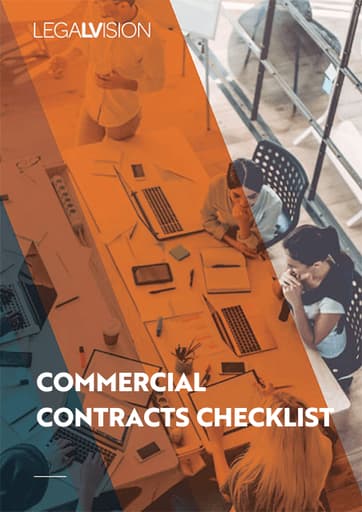In Short
- Always check the contract details, obligations, price, and exit rights before you sign.
- Make sure the contract reflects what was agreed, including who does what, who owns what, and how payments work.
- Understand how the contract can end and what happens afterwards to avoid disputes later.
Tips for Businesses
Slow the process down before signing. Confirm the correct parties are named, obligations match what was negotiated, and pricing is clear, including GST. Check termination and renewal clauses so you know how to exit if things change. If terms are unclear or one-sided, get legal advice before work starts.
Summary
This article explains the key steps business owners should take before signing a contract in Australia. It guides readers through common legal and commercial risks and is prepared by LegalVision, a commercial law firm that specialises in advising clients on commercial contracts and business agreements.
Signing a contract often coincides with an exciting time for your business. It might mean you have won some new business or found a new provider to help you grow your company. In any case, there is often a temptation to sign the contract as quickly as possible. However, if you do not undergo the correct processes, you could face legal issues down the line. This article will explain five key things to do before signing a contract.
1. Check Your Contact Details
While it seems obvious, ensuring that your written contract contains the correct details is a step many often miss. Having the correct name and address is crucial, especially if you need to issue a notice for breach of contract or a notice of termination in the future.
Similarly, making sure you have the correct business names will assist in ensuring that the contract is properly signed and executed. If you are contracting with an Australian company, the contract should also include their Australian Business Number (ABN) or Australian Company Number (ACN). If the right party has not signed the contract, you may not be able to use it later. You should also confirm that the execution blocks are appropriate for each party.
2. Review Parties’ Obligations
Obligations
Before signing a contract, it is essential to check both your and the other party’s obligations. The contract should clearly and carefully reflect each party’s obligations. You also want to ensure the contract does not include extra commitments you did not agree to when negotiating it.
Similarly, if your business receives services, check that your contract reflects all the services the other party has promised.
Rights and Protections
Contracts also contain clauses that define your rights and protections. It is important to understand these clauses before signing as they can significantly impact your business interests.
Typically, a contract will set out who owns certain types of material, such as software, creative works, logos, trade marks, or proprietary information. The contract should clearly reflect what you agreed to with the other party in negotiations. For example, if you engage a software developer to develop a website for your business, the contract would typically set out that you own the website. It should also specify whether you own the website immediately or once you pay the developer.
If the parties will be sharing confidential information, the contract should give the parties the right to share this information with their personnel and advisors as needed. It may also contain a protection that allows you to terminate the contract if the other party breaches their confidentiality obligations to you.
Another important protection is a dispute resolution clause. A dispute resolution clause ordinarily requires the parties to negotiate potential disputes before a party commences court proceedings. It may also involve mediation or arbitration. This can be helpful to preserve your business relationships and reduce your risk of getting involved in timely and costly legal battles.
Continue reading this article below the form3. Check the Price
It is critical to be clear on the price you will be paying (or receiving) under the contract. Also, double-check the conditions for you paying (or receiving) this price. This is particularly important if your contract involves either party providing ongoing obligations over time.
Some key things to confirm are:
- what the payment terms are (e.g. 30, 60 or 90 days);
- if you have to pay the price annually, monthly or once-off; and
- if the price can increase and what processes must be followed (e.g. annually or from time to time upon notice).
It is also important to clarify who is responsible for paying GST or other equivalent taxes. For example, you may have agreed to purchase equipment and supplies for a certain price that was within your budget, only to receive an invoice for an amount that is 10% higher due to GST. Not only would you be facing an unexpected expense, but you might also find yourself in a dispute with the supplier about who should bear this cost. Specifying whether the price includes GST or other taxes can help manage both parties’ expectations about the contract.
4. Know How to End the Contract
A crucial aspect of every contract is knowing how and when you can end it, if necessary. It is particularly important to check whether the contract will automatically renew and how to terminate the agreement if you do not wish to renew.
If you are receiving services, it will typically be beneficial to have a contract that allows you to cancel at any time, especially if you are not satisfied with the services you are receiving. If you provide services, you may prefer not to allow your customers to easily terminate the contract. Otherwise, you would likely suffer some loss from losing a customer.
When reviewing your contract, confirm the circumstances under which you or the other party can terminate it. For instance, will the contract automatically end after a breach? Likewise, what rights does the non-breaching party have? Typically, commercial contracts give the breaching party an opportunity to fix any breach before the contract terminates. Here, it may be important to specify what breaches would justify termination of the contract.
It is also important to understand what happens after your contract comes to an end. If there are any outstanding payments or services, the contract should specify whether these continue or end when the contract is terminated. If the other party has your property or confidential information, there should be a term of the contract requiring them to return it to you. Without clear terms, you may not know what your obligations are.
5. Talk to a Lawyer
While looking over a contract yourself will help you to identify any potential issues, sometimes you will need the expertise of a lawyer. You should engage a lawyer to review your contract before signing or agreeing to the contract, including before you perform any work. A lawyer can identify any key commercial and legal risks and explain any clauses you may not understand. This is particularly important if you are negotiating with a big business that has its own team of in-house lawyers. A lawyer can also confirm you have a legally binding agreement and that the document is free from unfair terms.
Importantly, while using standard form contracts you find online might be tempting, they may not be sufficiently detailed. Working with a lawyer is best practice as they can draft a legal document that is tailored to your business and the specific agreement. They can also turn any verbal agreement you might have with the other side into a written document. Written agreements remove ambiguity and can potentially reduce disputes.
Further, it can be challenging to recognise the risk associated with some clauses. This is especially true if the other party uses legalistic and confusing language to draft the contract. Seeking legal advice ensures you are on a level playing field with the other side. This will allow you to understand your risks and how to better protect your rights and interests before entering into the contract.

Reviewing contracts across your business? Download this free checklist to ensure clear terms, fair risk allocation and stronger commercial outcomes
Key Takeaways
Whether big or small, your business will constantly deal with agreements with customers, suppliers, employees and other business partners. Before jumping straight into work, you should always carefully review your contract to know precisely what you are signing and agreeing to do. Among other key terms, you must understand and confirm the contract’s:
- details;
- obligations;
- price; and
- termination.
Your business can manage risks by engaging a lawyer to review, explain and negotiate your contracts.
LegalVision provides ongoing legal support for all businesses through our fixed-fee legal membership. Our experienced contract lawyers help businesses manage contracts, employment law, disputes, intellectual property and more, with unlimited access to specialist lawyers for a fixed monthly fee. To learn more about LegalVision’s legal membership, call 1300 544 755 or visit our membership page.
Frequently Asked Questions
If the work starts before signing a contract, you may still be legally bound based on your conduct and the discussions you have had with the other party. You can be bound by both verbal and written communication. This can lead to uncertainty about what the terms of your agreement are, and can make it harder to negotiate the written contract.
If you have to provide the other party with confidential information to start work, such as design specifications or customer and supplier lists, there is a significant risk that this information will not be protected. If you need to share confidential information to discuss the terms of the contract, consider signing a non-disclosure agreement with the other party that protects the information you disclose in the negotiation phase.
Both handwritten and electronic signatures are widely accepted for most commercial contracts and are typically legally valid. However, you should check whether your specific contract has any requirements about how it must be signed. Some contracts, such as deeds, may have specific execution requirements that prevent you from using an electronic signature. Depending on your State or Territory, there may also be specific rules about which documents can be electronically signed. If you are unsure about whether you can execute your contract electronically, you can seek assistance from one of our experienced contract lawyers.
We appreciate your feedback – your submission has been successfully received.












